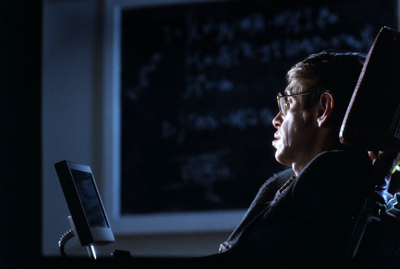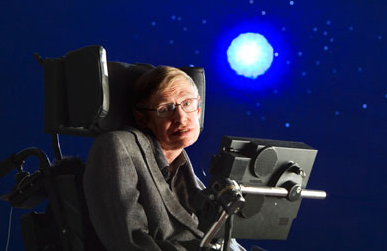
 |
|
|
|
Errol Morris is known for insightful documentaries that frequently draw large mainstream audiences, as with 2014's The Unknown Known. Gates of Heaven begins by inviting us to laugh at bereaved pet owners mourning their animal 'children', but soon slides into serious musings about the nature of human loneliness. The Thin Blue Line is famous for convincing us of a convicted prisoner's innocence; it eventually lead to man's release. Morris's 1991 A Brief History of Time takes a look at the remarkable Stephen Hawking, the celebrity astrophysicist responsible for several major theoretical breakthroughs despite living with an almost totally debilitating affliction. Instead of offering a biographical study or providing a lecture about theoretical discoveries, Morris blends the two to produce a portrait of a man who didn't begin to achieve until he had lost most of his physical freedom. Hawking would pose a challenge to any filmmaker, as he does not speak and is restricted to a motorized wheelchair. He has almost no control over anything except a clicker he holds in one hand. Various experts have customized a computer system allowing him to write, and to speak with an electronic voice. The personal computer arrived just in time to permit the brilliant Hawking to continue to communicate with the outside world. Otherwise he'd be a prisoner of a non-responsive body. 
Director Morris does go into Stephen Hawking's personal story, as family members, friends and colleagues discuss his upbringing and college career. Hawking was brilliant but often bored, and didn't take his studies very seriously even when he found that he could swiftly solve complex math problems far more quickly than his fellow students. Hawking didn't begin his conceptual journey of discovery until after his handicap struck. He chose to apply himself to astrophysics and cosmology because Albert Einstein had already proposed theories that bound together time, space, and movement. With his electronic voice, Hawking's explains why his investigation took various paths, and how he reacted to the theories of his contemporaries, etc. We hear testimony about Hawking's investigations from peer astrophysicists, who also remark on his personality and character. One of these gentlemen is the theoretician that coined the term "black hole". Hawking decided to apply the theory of black holes to the problem of the creation and destruction of the universe. We do learn a few things about the function of black holes, mainly what happens to matter that is drawn into one. We gain an appreciation of the questions Hawking and his cohorts are pursuing when they describe something called 'the singularity', in which matter is compressed into an infinitely small point, but of infinite mass. Morris brings in a few clips from Disney's underachieving The Black Hole, in which Hollywood actors talk about the theoretical phenomenon as if it were an unknowable religious experience. We viewers of A Brief History of Time identify with them. 
At one point Hawking explains that he prefers to describe his theories in graphics because he conceptualizes better with images than with pure mathematics. The drawings illustrating his theories are so advanced as to be meaningless to most of us. That most of what he studies does not lend itself to simplification is an understatement: Hawking considers elusive ideas like "imaginary time" to be elementary concepts. Actually, one phenomenon theorized, discarded and then re-theorized by Stephen Hawking does communicate well. The gravitation of black holes interrupts the mutual creation-destruction cycle of paired matter and anti-matter particles (stop laughing, particle physicists) leaving orphaned bits of matter and anti-matter to speed off into space. Thus 'Hawking Radiation' shows that some matter does escape from black holes. The more we contemplate Stephen Hawking's personal situation, the more it seems to be a microcosm for the universal human condition of our relationship with the cosmos. The motor neuron disease that put Hawking into a wheelchair also focused his thoughts on scientific pursuit. It's as if the daunting physical restrictions caused his mind to expand, a thought echoed by more than one of his peers. Hawking defines his function as the asking of 'giant' questions: "Where did the universe come from and where is it going? " "If it had a beginning, what was there before?" "What is time, and why can't we remember things in the future the way we remember things in the past?" One half expects Hawking, as have many scientists, to advance a firm atheistic philosophy. He instead comes forward with a statement that the discovery of a unified scientific theory "for everything" would bring science and religion together. The discovery of a complete theory "would be the ultimate triumph of human reason-for then we should know the mind of God." 1 
Errol Morris mostly uses simple graphics to energize the screen, without trying to dazzle us with big numbers or "gee whiz" science fiction visuals. The film also has a sense of humor. As if to 'break the ice', the initial question of 'which came first, the chicken or the egg?' gives us a giant chicken head floating in a field of stars. Hawking is naturally seen only in his wheelchair, his hand using a simple clicking switch to write. Yet the picture isn't a portrait of an invalid and we aren't given a rundown on his daily care. An interviewee does tell us that Hawking drives his motorized wheelchair to his Cambridge office every day, accompanied by a nurse. We understand why this man is considered a scientific superstar and an invaluable human resource. A Brief History of Time will definitely motivate viewers to seek out more information about Stephen Hawking and his discoveries, and to learn what has transpired since Morris's film and the present. Criterion's Dual-Format Blu-ray + DVD of A Brief History of Time is a tidy little documentary put together with Errol Morris's simple yet persuasive progression of clean visuals. The interview subjects are photographed against a variety of backgrounds. If the interviews are stylized, it's that most of them speak with the same slightly muted enthusiasm - they know that the man they admire is a unique phenomenon. The audio is crisp and clear. Hawking's robotic voice is somehow soothing, not sinister. Frequent Errol Morris collaborator Philip Glass provides the ethereal music score for A Brief History. Some liken Glass's tracks to musical wallpaper but I find that this score concentrates attention on the the subject matter, as opposed to illustrated concert films, like Godfrey Reggio and Glass's Powaqqatsi. The extras are short and sweet. In one video interview director of photography John Bailey remembers his experiences working with Stephen Hawking, and trying to find a proper visual approach for this unusual movie. Errol Morris talks about the challenges of adapting Hawking's book into something more interesting than an illustrated lecture. Morris had a college background in science, which kept him from feeling totally overwhelmed by Hawking's theoretical work. The insert pamphlet contains an essay by David Sterritt and two Stephen Hawking book excerpts. In one Hawking notes a pattern used by almost every review of his book. Having written my review before reading the excerpt, I'm amused to find that my attempt to fathom A Brief History of Time follows this template very closely.
On a scale of Excellent, Good, Fair, and Poor,
A Brief History of Time Blu-ray rates:
Footnotes:
1. We reference what we know: Hawking is like The Incredible Shrinking Man, an 'afflicted' everyman who discovers that his unique problem gives him a special advent into a new world of unique revelations. One of Hawking's peers ventures that his disease has augmented his mental capabilities. Hawking's rather comforting electronic voice also reminds us of Alphaville's computer Α-60, which speaks with a harsh mechanical croak.
The version of this review on the Savant main site has additional images, footnotes and credits information, and may be updated and annotated with reader input and graphics.
Review Staff | About DVD Talk | Newsletter Subscribe | Join DVD Talk Forum |
| ||||||||||||||||||